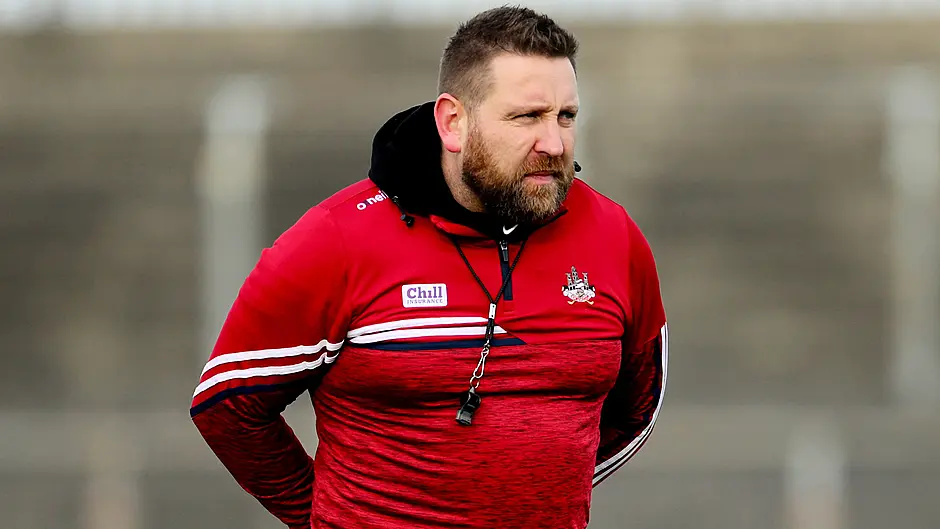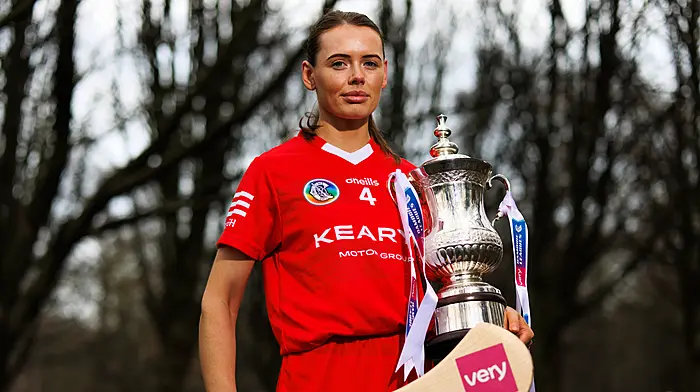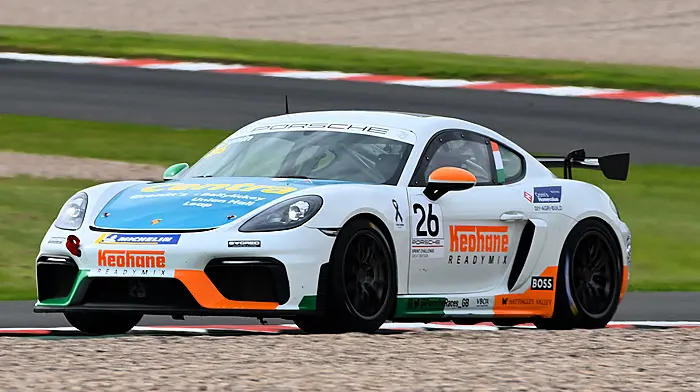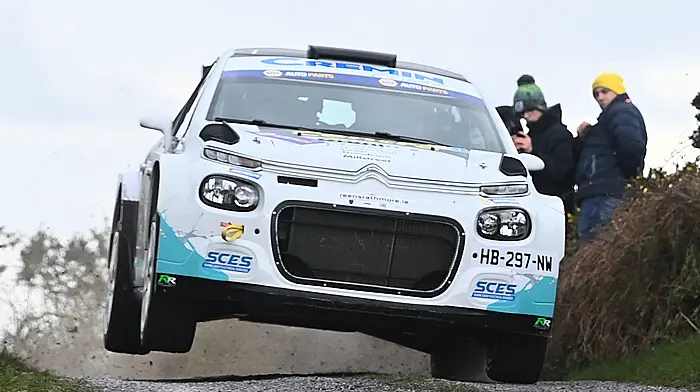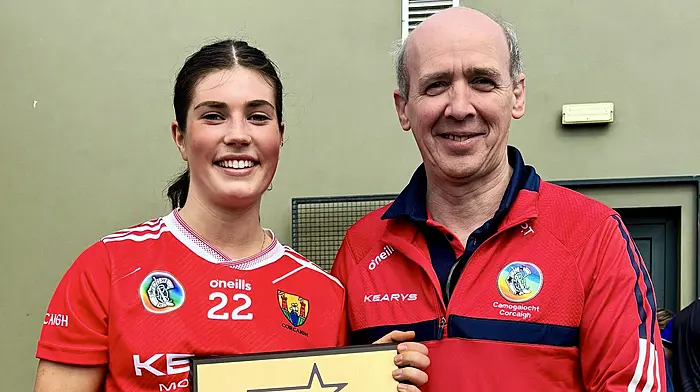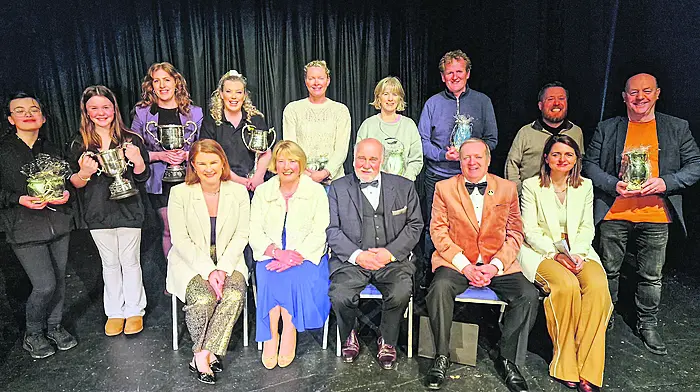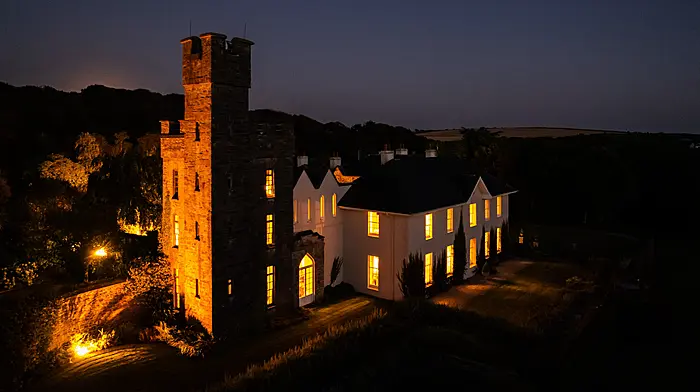CIAN O’Neill initially turned down Ronan McCarthy’s advances last summer. The Cork boss wanted the Kildare man to come on board as a coach with the county footballers. Thanks, but no thanks. It wasn’t the right time.
O’Neill had made a promise to his wife, Tammy, and was sticking to it. Also, 15 years of being involved in inter-county management teams had taken their toll. He felt tired.
McCarthy’s approach came a couple of weeks after O’Neill had stepped down as manager of the Kildare footballers. He’d spent four years in charge of his native county, taking them from Division 3 to Division 1 and reaching the inaugural Super 8s. But now it was time to recharge the batteries.
O’Neill is CIT’s Head of Sport and when McCarthy got in touch, he presumed it was about internships for some of his students.
This conversation went a different direction. McCarthy was keen for O’Neill to join his backroom team.
‘I politely declined for no other reason than I had promised my wife that I would take a break,’ O’Neill explains.
‘Ronan knows better than most what’s involved at this level so he knew where my head was at in terms of being tired. He said, “take some time to think about it, it’s a big decision, talk to your wife, see what she says”.’
O’Neill never mentioned the conversation to Tammy. Instead, he left it there.
‘If I’m being perfectly honest, I had wanted to take a year out, to recover, recalibrate and to focus on other things in life after four years in management myself,’ he explains.
‘It had been non-stop year after year in inter-county management, Limerick to Tipp to Mayo to Kerry to Kildare. I was just tired. The travel had taken its toll too, naturally enough, two hours up and down from Douglas to Kildare. That was where my head was at.’
A couple of weeks later, McCarthy got in contact again. He’s a persuasive man. He also knew O’Neill’s stock and value, that he was a game-changer and that he could improve a Cork football team that was facing into a first-ever season in Division 3.
McCarthy’s approach was clever. He played the waiting game. O’Neill’s initial desire to stay clear of the inter-county scene was quickly waning. The barriers from the first conversation were gone. There were only so many times O’Neill could cut the lawn or clean out shelves at home. He was looking for things to do.
‘You know when you really love something and you have a passion for it, it’s very difficult to just press pause, never mind stop,’ O’Neill explains.
‘I was missing it already.
‘Ronan didn’t need to convince me about the quality of the group, for me it was more about the home situation. I went home and said it to Tammy and at that stage I think she was sick of the sight of me! It was incredible how supportive she was. That opened the door to more conversations with Ronan and we are where we are.’
***
O’Neill certainly has Cork footballers all singing from the same hymn sheet. The noises from inside the camp have been positive since the Newbridge man came on board. We put out a few feelers and one phrase kept popping up.
‘Game specific.’
‘Match specific.’
‘Game specific.’ Again.
O’Neill has worn the manager’s hat, but his passion is coaching. That’s how he built his reputation as progressive and innovative. His first job, when he was 27 years old, was as a coach under Mickey Ned O’Sullivan with the Limerick footballers back in 2006. Then he spent four years as physical coach with the Tipperary hurlers and they landed the All-Ireland in 2010.
Next stop were the Mayo footballers and O’Neill was involved as they reached the 2012 All-Ireland final. Eamonn Fitzmaurice brought him on board in Kerry for three years (2013-15) and an All-Ireland followed in 2014. Then O’Neill made the step up from coach to manager with his native Kildare and spent four years there (2016-19).
It’s an impressive track record. There’s a bank of knowledge and experience there that Ronan McCarthy knew could help his young Cork team that is eager and willing but a little green around the edges.
The addition of O’Neill to the management team that also includes Sean Hayes (Nemo Rangers) and Gary O'Halloran (Ballinora) has allowed McCarthy take a step back from the hands-on coaching – and O’Neill knows the benefits of this better than most.
‘The biggest mistake I probably made in my first year as manager with Kildare is I tried to do too much on the pitch while also trying to manage,’ he explains.
‘I stepped away a little bit from coaching in year two and brought in a really fantastic coach in Ronan Sweeney. I could see the transformation and the dynamic then when I had more time to look at the off-the-field work.
‘That’s where Ronan is at. He trusts me to do my job on the field. We all still have our chats before and after training sessions, and we have a really positive dynamic.’
O’Neill’s impact with Cork was instant. The players are enjoying his sessions. Everything is match specific, it’s all game-based and the Cork footballers have never experienced anything on this level before.
Nearly every session has a 15v15 game and everything has a purpose. If O’Neill wants to work on Cork’s kick-outs, or on Cork’s kick-out defence, that’s integrated into training games. This was more and more apparent as the Division 3 league campaign progressed – if O’Neill spotted an area that could be improved, that was implemented into training for the next game.
Before Cork’s home win against Derry at the start of March, O’Neill saw there was work to be done on Cork’s short kick-outs so he tweaked that. If Cork come up against a massed defence, then the wing backs were told to continue their runs all the way into the full-forward line to not clog up the space around the 45. Small details, but they all make a difference.
After Cork’s 0-16 to 1-8 home win against Down in February, a match where the Rebels finished with 13 after Sean White’s red card and Kevin Crowley’s late injury, Ronan McCarthy commented afterwards: ‘You are seeing a lot in the team of Cian's coaching, he’s great at getting the players to play different scenarios in training. It is those scenarios they have come across and they know what to do and how to see it out.’
O’Neill’s influence within the set-up is growing. Five wins from five games left Cork top of Division 3 and closing in on promotion before all GAA activity was suspended due to the coronavirus crisis, but up to then the signs were encouraging.
‘You could see things happening and transforming on the pitch, slow initially because they were getting used to me and I was getting used to them but, by God, the rate of development and improvement has been phenomenal – and that’s down to the players and their attitude, application, work ethic,’ O’Neill says.
***
He knows he will get asked this question. It’s an obvious one: is it strange not being the manager and not being the number one?
‘If I’m being really honest, I love coaching more than anything else,’ O’Neill says.
‘I love being on the pitch, not in the boardroom or the meeting room because that’s my job every day with CIT. This opportunity with Cork was a perfect fit.
‘All the other pressurised aspects of the job, be it county board, sponsors, media, they are all fine but for 99 per cent of managers in the country if they had a choice that someone else could do them, they’d take that option.’
O’Neill’s focus now is on coaching. He did play before, for his club Moorefield, impressing enough for Mick O’Dwyer to call him into the Kildare set-up for training. But then disaster struck in the early noughties.
‘I was on my way back to Limerick where I lived for 17 years before I moved to Cork, I was a student at the time, coming back from a training session with Kildare. I was involved in a car accident and that was the end of it,’ O’Neill recalls.
That six-car pile-up finished his playing career. He needed to have two discs removed from his back. He turned to coaching. His first job was with Kilmihill in Clare and he took them to the intermediate county final in 2005. He was up and running. Soon after, Mickey Ned and Limerick came calling.
‘I could be working on the line giving in water, I could be cleaning the dressing-room after, I could be doing whatever, as long as I am helping a group of players – no matter what the level, ability or standard – then I’d be happy because I love being involved with teams,’ O’Neill says.
‘The Cork opportunity was a perfect fit. Ronan was very clear in what he wanted. Role clarity is something that we speak about to the players all the time, how they need to know their role and then execute. Ronan laid it out for me very clearly what he was looking for – and it’s exactly the role that suits me right now.’
There are no clashing philosophies or ideologies within the Cork set-up, O’Neill adds. McCarthy is the leader, the director, and everyone in the management team has their role to fulfil. It’s working.
***
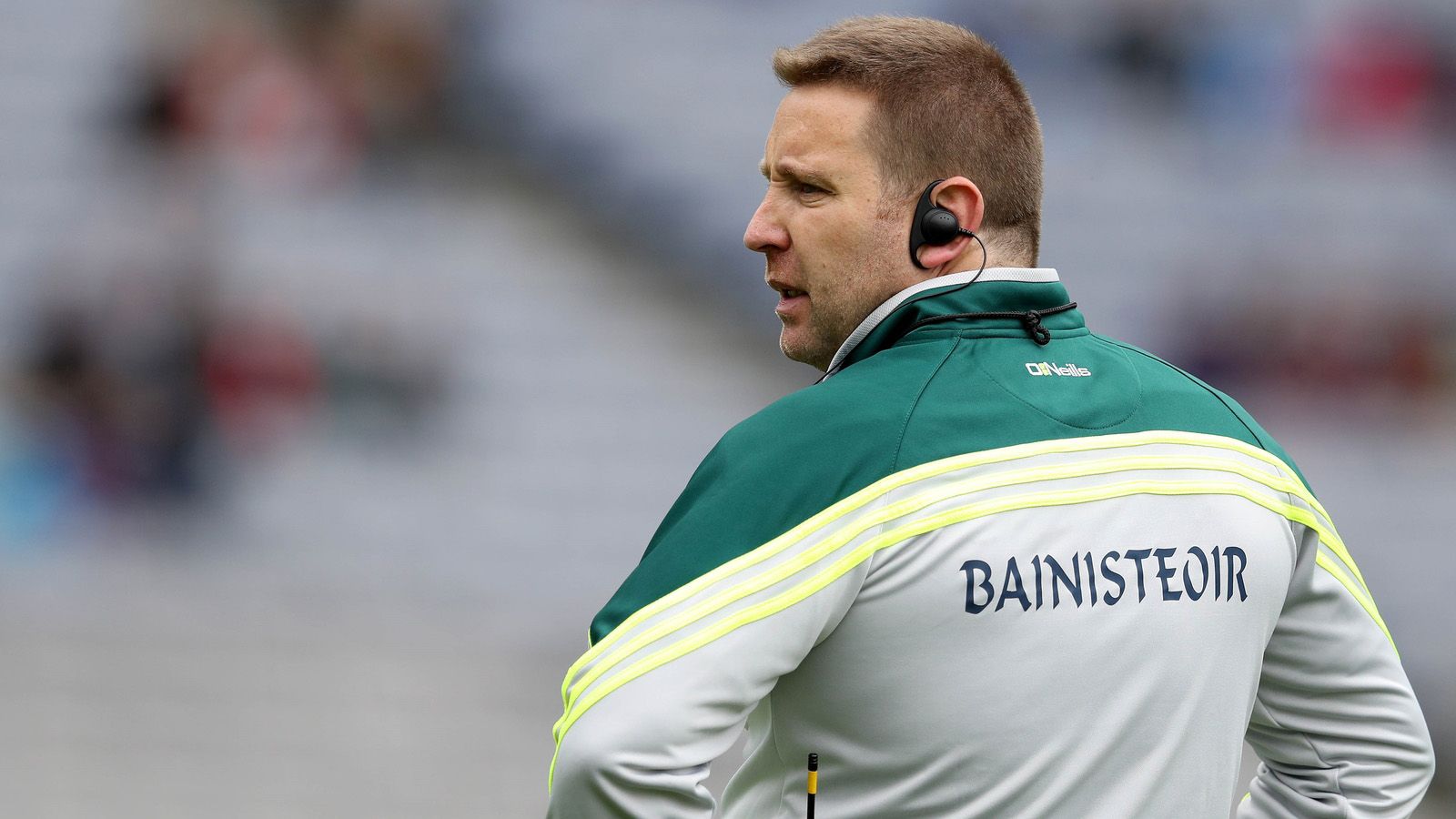 Cian O'Neill was manager of his native Kildare for four years.
Cian O'Neill was manager of his native Kildare for four years.
There are similarities where Cork are now and where Kildare were when O’Neill took charge in 2016.
Straightaway he could draw parallels with where the players and the management were at, because he had the same experience himself.
‘Where Cork have found themselves in recent years is not that different to the situation that I picked up in Kildare when I started, insofar that they dropped from Division 1 to 2 to 3 very quickly and didn’t have much joy at championship level either,’ he explains.
Cork supporters will hope the Rebels enjoy successive promotions like Kildare did on their way back to Division 1 under O’Neill, but years of false dawns and some heavy beatings mean that fans aren’t too trusting of the Cork senior football team. That’s understandable. But Cork’s winning streak in the league, albeit in Division 3, offers some hope. There are enough green shoots to start hanging some hope off.
‘It’s great to have the five wins under our belt but based on the standards we set ourselves, we know we are not even close to reaching the potential that is in this group,’ the Cork coach states.
‘We are winning matches but we know we haven’t got to the level where we can be, and nor should you ever be there in the league. I think that is something that is really driving the players. They are self analytical and self critical in their own right, coming off matches like against Tipperary and Down when they should have been put to bed a lot earlier than they were.
‘They know they can do lots of things for 20 minutes, for 30 minutes, for blocks of 10 minutes, but the real improvement is when we can put together that 70-minute performance and that’s what we are really striving for.
‘We are striving for impact off the bench, striving for game management which has let them down over the years, and that’s synonymous with a lot of teams who are trying to get over the hurdle and into that top echelon. It’s that consistency that gets you up there.
‘There is a humility there because we know we are improving but we are not there yet and that is driving this group on.’
That momentum Cork were building is gone now with the leagues in limbo. That development has stopped, for now.
Players have to train on their own now, following programmes set out for them. Who knows if and when the GAA season will resume this year, but O’Neill says it’s the teams that adapt the best to the conditions that we are facing at the moment that will thrive when the football season throws back in.
But there is an opportunity now for players to develop their skills, albeit in an individual setting.
‘You can do as many kicks off a wall but if there are no constraints regards space, time, pressure and contact, it’s not the same. But if they work on the technical aspects, hopefully we can transfer them into more game-specific situations when we get back,’ he says.
That’s that phrase we were told about: ‘game-specific’. It’s one of the reasons he’s made an impression on Leeside. O’Neill is not the first Kildare man to make an impact with Cork. Think of Larry Tompkins and Shea Fahy. But the Newbridge man could be one of the most important coaching additions in a long, long time.
It’s a good job that Ronan McCarthy didn’t take no for an answer.

